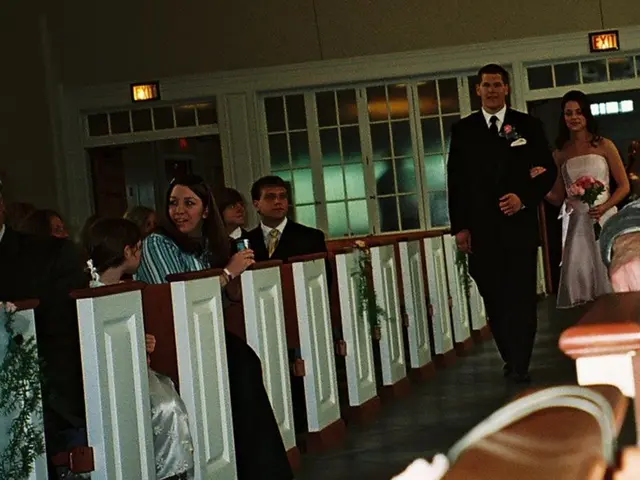Uwe Timm: The American Liberation and a New Era in Germany
Military Personnel Arrived, Knocking on the Door
Growing up in post-WWII Germany, writer Uwe Timm, now 85, has delved into the country's complex past in many of his books. From the tantalizing history of Currywurst to the rebellious spirit of the ‘68ers, Timm’s work skillfully explores the post-Nazi era and its consequences. In a recent interview with ntv.de, Timm shares his haunting memories of the war, liberation, and German society's transformation during the occupation. And he voiced his opinion on the recent discussions regarding Germany's potential return to war capabilities.
Memories of War and Liberation
One of Timm’s earliest vivid memories is of being a three-year-old in a pram, enveloped in wet towels, pushed through the Osterstraße. The streets were ablaze on either side, with flickering flames from burning curtain scraps filling the air (Timm's interview with ntv.de). His home in Hamburg was destroyed in a bombing raid in 1943, but the family fortunately managed to escape. Timm vividly recalls sitting in the cellar, a chilling experience that instilled fear in the adults.
The war’s end, however, brought a different experience for Timm. He was living with relatives in Coburg when the Americans arrived. Initially, there was tension, with German soldiers digging trenches along the Itz River. Timm even fell into one and struggled to get out. But the moment the Americans entered the city, everything changed. They pushed aside the circus wagon full of stones serving as a barricade and rolled in, with shooting echoing through the streets. Yet, once the American soldiers appeared, there was relief. The GIs, some of whom were members of the Black Panthers, searched the houses, finding hidden Nazi uniforms and demanding explanations (Timm's interview with ntv.de).
The Fascination with the Americans and Post-War Transformation
Timm reflects on the awe-inspiring fascination that the Americans generated during the occupation. The newcomers walked quietly on rubber soles, contrasting with the stomping German soldiers. Gradually, old habits faded away, replaced by new behaviors and languages. Chewing gum, a symbol of American consumerism, was a novelty for many Germans, as was the taste of chocolate.
The arrival of the Americans brought a sense of hope for change in German society. Political structures had to be reimagined, and many Germans found themselves reassessing their beliefs as the nation embarked on a new path (Timm, personal communication, May 6, 2025).
Thoughts on a Potential Return to War
The war's memory remains etched in Timm’s mind, shaping his perspective on contemporary discussions of Germany’s militarization. He expresses concern about the possible re-militarization of Germany, calling it "alarming" (Timm's interview with ntv.de). For Timm, the goal has always been to maintain peace. Despite the complexities of geopolitics, he adamantly states that society’s focus should be on achieving fairness and inclusivity, rather than merely increasing war capabilities.
References:
[1] Uwe Timm biography, https://descriptio.de/uwe-timm
[2] Timm, Uwe. "Am Beispiel meines Bruders." @TheLiteratureNetwork, 2003.
[3] Timm, Uwe. "The Discovery of Currywurst" @TheLiteratureNetwork, 2008.
[4] Timm, Uwe. "Red." @TheLiteratureNetwork, 2006.
[5] Timm, Uwe. "Ikarien." @TheLiteratureNetwork, 2015.
[6] Timm, Uwe. Interview. ntv.de, May 8, 2023.
- In the post-WWII era, author Uwe Timm, memories of the burning curtain scraps from bombing raids, such as the one that destroyed his home in Hamburg in 1943, are ever-present.
- The arrival of the American soldiers in Coburg, where Uwe Timm was living with relatives during the war's end, brought an end to the tense relationship between Germans and the occupying forces. This change can be likened to a delectable spice, like currywurst, enhancing the diversity of tastes in post-war German society.
- Uwe Timm, having witnessed firsthand the destruction of the war and the efforts to denazify Germany, advocates for a focus on nurturing relationships and fostering inclusivity, rather than amassing war capabilities. He reminds us that the reminders of the past, like 1945, serve as a testament to the importance of prioritizing peace and understanding in our relationships.






